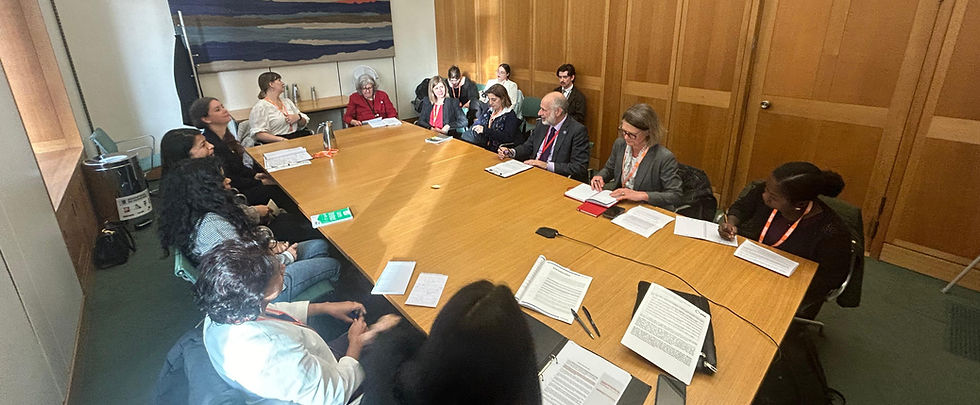Peace Without Justice? Ending Impunity in Post-Conflict Nepal
- goffej
- Oct 21, 2024
- 3 min read
Updated: Nov 27, 2024
Peace Without Justice? Ending Impunity in Post-Conflict Nepal:
Report Launch and Roundtable Discussion 22.10.24
In attendance:
Dr. Mandira Sharma - Nepali Human Rights (“HRs”) Lawyer, Advocacy Forum
Gita Rasaili - Dalit Nepali Human Rights Defender (“HRD”)
Christina Challis - Advocacy Manager, Peace Brigades International UK
Haydée Dijkstal - Barrister, 33 Bedford Row (Member of International Lawyers’ Delegation to Nepal)
Camila Zapata Besso - Barrister, Doughty Street Chambers (Member of International Lawyers’ Delegation to Nepal)
Nicole Piché – PHRG
Jodie Goffe – PHRG
Chair: Fabian Hamilton – Chair, PHRG. Fabian was an election observer in 2013 and visited with the International Development Committee in 2015.
At this roundtable, HRDs provided testimony and members of the International Lawyers’ Delegation to Nepal (March 2024), launched their report ‘Peace without Justice and Accountability? A caution against impunity in post-conflict Nepal’ (“The Report” – see: https://peacebrigades.org.uk/news/idilnepallaunch).
Main Points:
The armed conflict between the Royal Nepal Army and the Communist Party of Nepal ended almost 20 years ago, with its 10-year span tragically marked by thousands of deaths, 1000+ disappeared, torture, arbitrary arrests, sexual violence, and crimes against humanity, by both parties.
The Peace Agreement marking the end of the conflict committed the parties to establishing the truth and ensuring victims received both justice and reparations, but only this August was a transitional justice (“TJ”) process agreed by legislators.
Much remains to be done to implement, and remedy the deficiencies of, this legislation; to provide protection to victims who come forward, and to ensure victims are central to every stage of the TJ process.
Impunity is deeply rooted in Nepal, with social position largely determining the level of access to justice.
The case of Gita’s sister, who was abducted and gang-raped, is emblematic, and Gita has spent years trying to obtain justice. Some perpetrators have been convicted but none are serving their sentences.
Gita has met so many others who have been victims of abuse, or their family members. The courts have ordered investigations, but this has not been followed through. Victims now want their voices heard.
Some victims have received reparations, but believe a TJ process is essential: to establish a record of what happened during the conflict; foster national reconciliation; and strengthen the rule of law.
Both parties to the conflict are now in positions of power, and have evidence of the crimes which took place. Doubts remain about their political will to engage meaningfully with a TJ process.
CSOs can facilitate victims’ agency in the TJ process, and the collection and preservation of evidence. CSO space more generally, therefore, must be protected, yet there are fears it is shrinking.
The international community should offer technical and financial support to the Nepali Government and CSOs/HRDs, with the UK able to draw on its experience in Northern Ireland.
More specifically, the Report calls on:
the Nepali state - to expedite a TJ process to ensure victims of the conflict obtain redress, and to amend the TJ Law to enable an effective and inclusive process; and
the international community - to insist TJ in Nepal is in line with its international HRs obligations.
PBI UK’s practical actions for UK Parliamentarians, further to the Report’s recommendations:
Encourage the UK Government to support an inclusive TJ process in Nepal in line with international law, including through diplomacy and aid.
Monitor legal action in the Nepali Supreme Court challenging some of the provisions of the TJ Law.
Ensure sentences reflect the gravity of the crimes and prosecutions proceed without political interference.
Ensure justice for women, as well as other vulnerable groups, and their historical marginalisation is addressed.
Encourage the observation of trials of HRDs and speak out when they are threatened.
Sustain regular engagement with Indigenous HRDs to understand and respond to the threats they face.
An FCDO Minister is likely to go to Nepal in the coming months, and should stress the importance of a victim-centred TJ process, and the need to balance restorative and retributive justice.
The PHRG will raise greater awareness of these issues in Parliament and more widely, and continue to closely monitor related developments.

